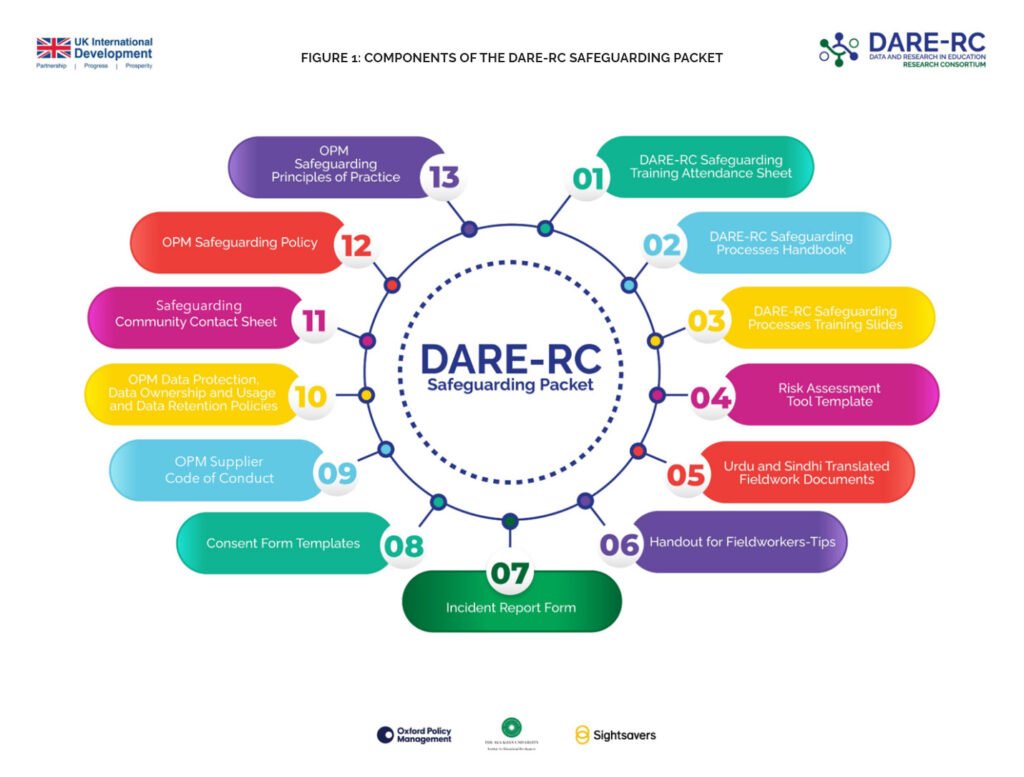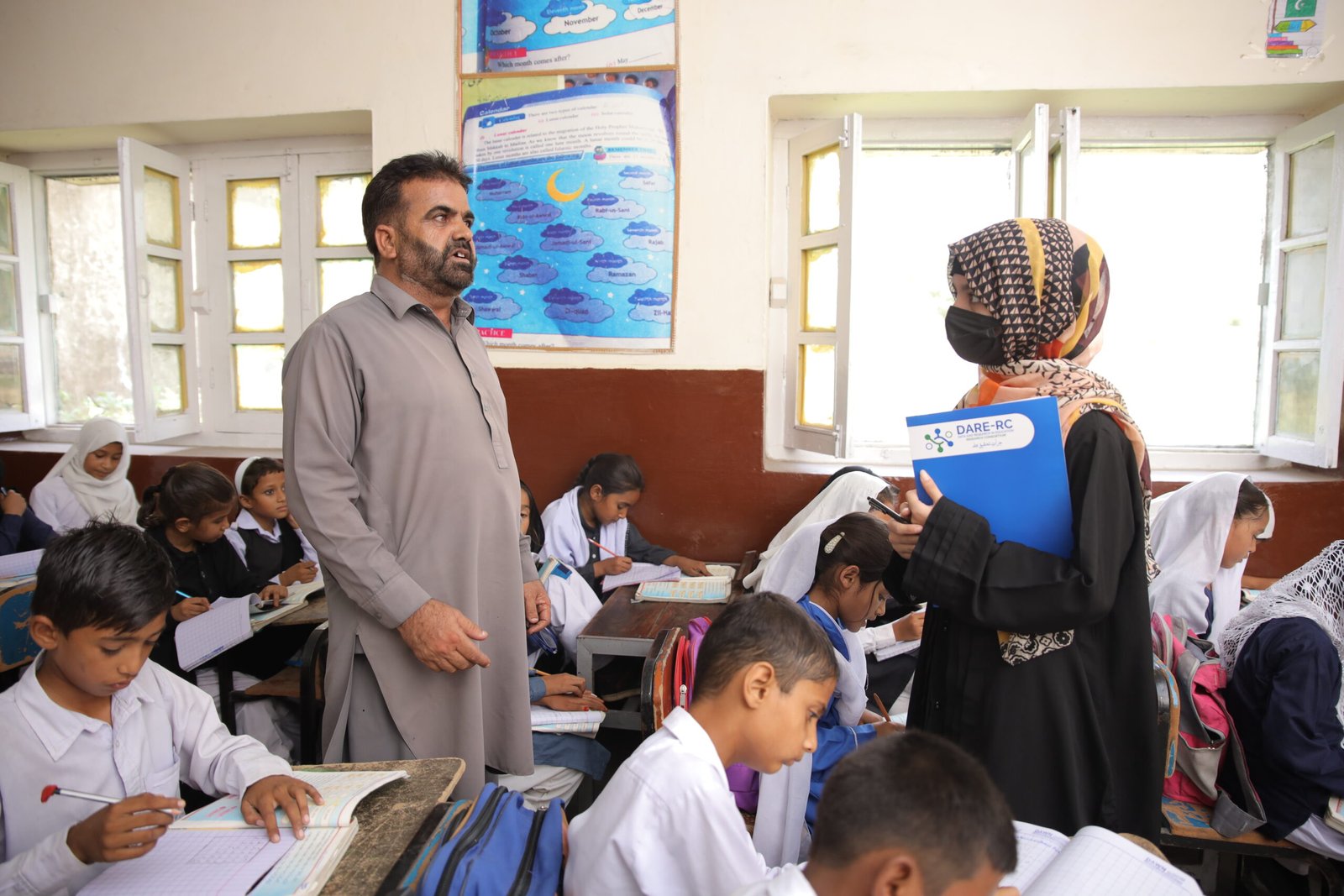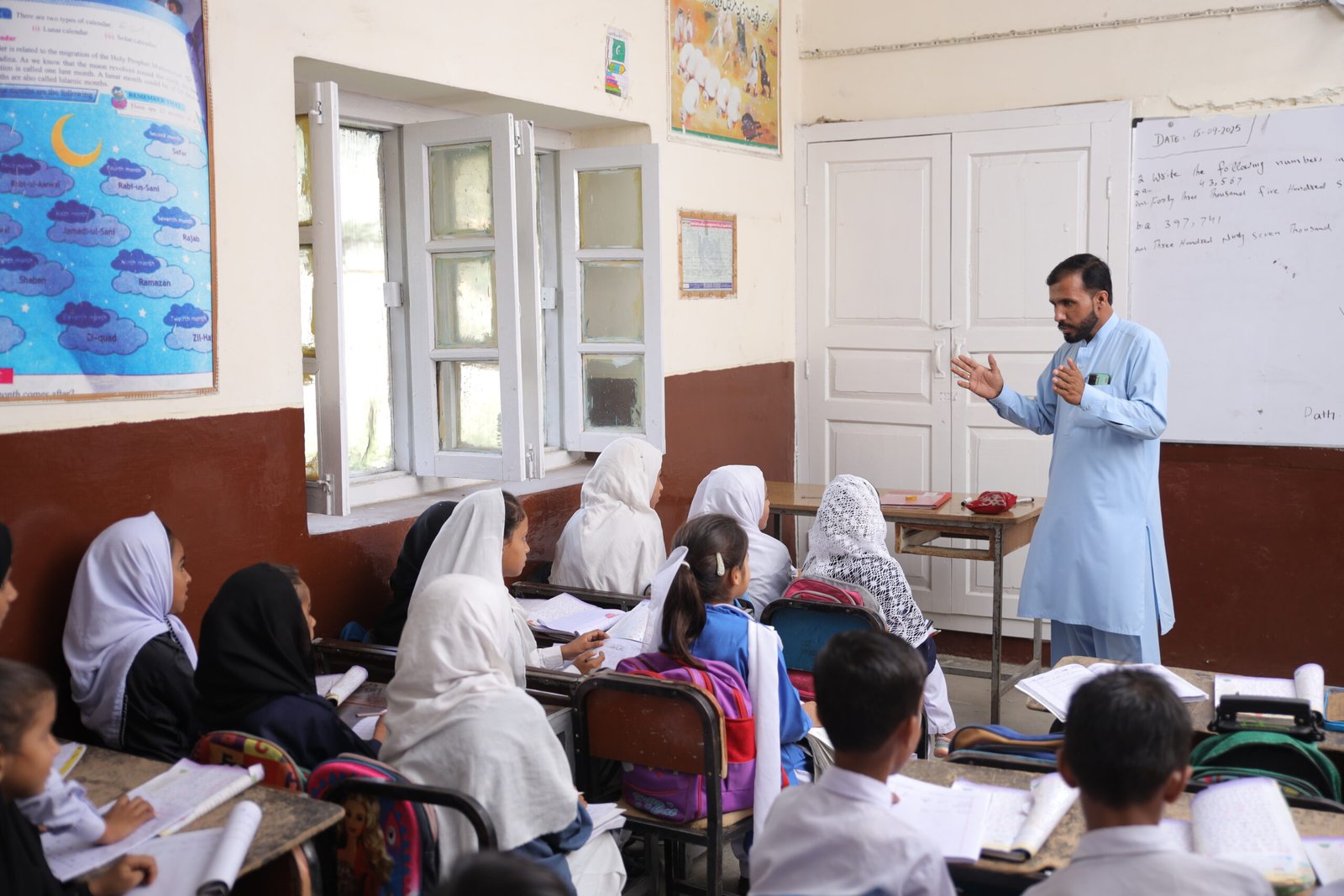Researchers in the field may find themselves faced with an ethical responsibility: to respond if they gain knowledge of or witness direct harm to participants. The likelihood of such an instance is higher when conducting field work among vulnerable communities. Data and Research in Education – Research Consortium (DARE-RC) supports its research teams to be aware of and ready to respond to such challenges.
As part of the Foreign, Commonwealth & Development Office (FCDO) funded DARE-RC programme, several consortium-led and grant funded research studies are being commissioned in various parts of Pakistan. Research teams have been mobilised across all four provinces of Pakistan (Balochistan, Khyber Pakhtunkhwa, Punjab and Sindh) as well as Gilgit Baltistan. Undertaking field research requires sensitivities to navigate and investigate within diverse communities across the country and necessitates having robust safeguarding policies and protocols in place to ensure no harm is done to participants.
All research teams are expected to follow stringent safeguarding requirements, such as going through the DARE-RC Safeguarding Training to ensure our presence, work and personnel are not causing harm, especially to children and vulnerable adults. Researchers are also obliged to be mindful of the power imbalance regarding the community or individuals in which they are engaging with including factors such as age, gender, ethnicity, socioeconomic status, religion and education background, etc.
| What do we mean by ‘safeguarding’? Safeguardingmeans taking all reasonable steps to prevent harm occurring to others as a result of the work that we do, promoting the welfare of vulnerable people, and protecting those who are at risk from harm. Vulnerable people typicallyinclude children and young people under the age of 18, and any person who may be considered vulnerable because of their age, a physical or mental disability or due to other circumstances. See Oxford Policy Management ‘s (OPM) Policy on Safeguarding of Vulnerable Persons to learn more about OPM and DARE-RC’s approach to safe and ethical research practices. |
The aim is to prevent all forms of harm from occurring in the first place. Safeguarding measures also work to ensure that a victim/survivor-centred approach is taken whereby proper response and action measures are executed when incidents do arise or come to our attention.

What is Included in DARE-RC’s Safeguarding Training Packet?
The Safeguarding Packet is made up of several relevant OPM standard policies, the DARE-RC Safeguarding Handbook, DARE-RC Safeguarding Training slides, various key fieldwork resources (i.e. consent forms, tips for fieldworkers, safeguarding community contact sheet, and incident report form), the Risk Assessment Tool template and other materials. It is expected that all research and data collection personnel review these documents prior to commencing fieldwork.
Consent Is Key
For ethical purposes, it is essential that all participants provide consent prior to being interviewed or included in a research study. The consent forms must use accessible and sensitive language and cater to the specific target population. In the case of young children and individuals with lower literacy levels, verbal assent can be obtained as well. It is important to note, while confidentiality is fundamental, it does not override our duty to protect the participants in case of any reported misconduct.
How to Handle Incidents?
While in the field, we may be trusted by vulnerable people with information related to incidents of harm, abuse or neglect that they feel can be brought to our attention which may not be directly related to our work. Instead, we come to know about them by virtue of our presence in the community. We may even witness harm done to children or vulnerable adults during fieldwork or hear about/witness harm done by a fellow colleague. How do we, as researchers, respond in the face of such incidents? Listening attentively without judgement, logging relevant information in the incident report form and following the incident reporting procedures without taking matters into our own hands is important for the safety and wellbeing of the researchers, individuals reporting incidents and the respective victim(s).
Not only do we have a moral obligation to report incidents of harm, but we also have a contractual obligation to do so. Ultimately, our work aims to improve lives. Safeguarding is our responsibility considering that vulnerable people do not always have the power or skills to protect themselves.
Furthermore, DARE-RC has developed a Support and Referral Network in Pakistan that we may utilise when needed. It is made up of NGOs and government entities working on human rights, child protection and women’s rights issues providing awareness, legal and psychosocial support as well as shelter facilities.
Want to Learn More?
Numerous global resources and standards are available for organisations working in the humanitarian, aid and development sectors. A few include Keeping Children Safe, the Safeguarding Resource and Support Hub and the CHS Alliance.
Keeping Children Safe sets International Child Safeguarding Standards (The International Child Safeguarding Standards – Keeping Children Safe) to help organisations protect children from abuse. One of the requirements for all research teams working under DARE-RC is to complete the Risk Assessment Tool developed by KCS to identify potential risks (i.e. regarding cultural norms, data collection, questionnaire design, data protection, staff, etc.) to vulnerable people related to our work and develop mitigation strategies to address them.
Additionally, the Safeguarding Resource and Support Hub (Safeguarding Resource and Support Hub) is a programme that aims to strengthen safeguarding policies and practices against Sexual Exploitation, Abuse and Sexual Harassment (SEAH) of organisations working in the aid sector. A valuable resource they provide is a safeguarding training which is available in several languages to enhance accessibility. The CHS Alliance (CHS Alliance), a global alliance of humanitarian and development organisations committed to making aid work better for people, is leading an initiative funded by FCDO called the SEAH Harmonised Reporting Scheme (alongside the Steering Committee for Humanitarian Action). This aims to increase reporting of incidents by supporting NGOs and private sector organisations in collecting and reporting SEAH incidents in a more uniform way. It is currently being piloted. From April 2024 – September 2024, 178 incidents were reported by the SEAH Harmonised Reporting Scheme (HRS) participating organisations with 63% of incidents being against aid recipients and their communities and 37% of incidents against staff members.

Taken From: SEAH HARMONISED REPORTING SCHEME (HRS): Insights on Sexual Exploitation, Abuse & Harassment (SEAH) incidents against aid recipients and their community.
Ultimately, the goal behind safe and ethical research practices is to treat individuals and communities with dignity and respect and particularly promote the welfare of vulnerable people by putting them at the centre of our programme design and implementation.
Click here to learn more about DARE-RC’s research priorities and areas.
–
Authors: Jasmine Abraham (Former – Consultant, Education at OPM) and Dr Monazza Aslam (Research Director, DARE-RC)
Editor: Maryam Beg Mirza (Assistant Consultant, Education at OPM)
Designer: Farhad Jarral (Communications Lead, DARE-RC).
Quality Assurance: Dr Sahar Shah (Research Manager, DARE-RC)
The views expressed in this blog are that of the author and do not reflect the views of DARE-RC, the FCDO, and implementing partners.




